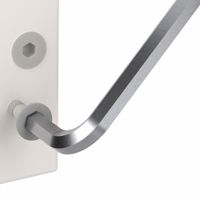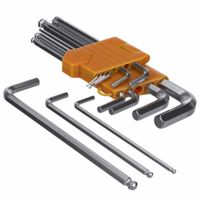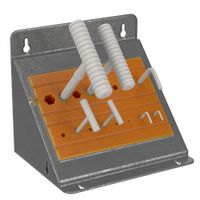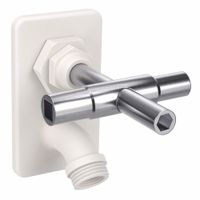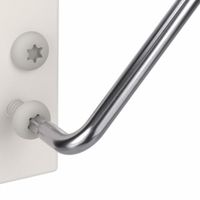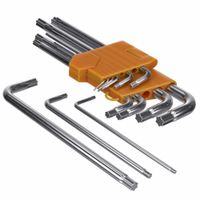Call +(254) 703 030 000 / 751 483 999 / 721 704 777
- Home
- Tools
- Hand Tools
- Screwdrivers Nut Drivers Keys
- Hex Torx Service Keys
.....Read More
Frequently Asked Questions
What is the difference between Hex keys and Torx keys?
Hex keys, also known as Allen wrenches, have a hexagonal cross-section and are used to drive bolts and screws with hexagonal sockets. They are typically L-shaped, providing leverage and torque. Hex keys are commonly used in furniture assembly, bicycles, and machinery.
Torx keys, on the other hand, have a star-shaped cross-section with six rounded points, designed to fit Torx screws. This design provides better torque transfer and reduces the risk of cam-out compared to hex keys. Torx keys are often used in automotive, electronics, and appliance industries due to their precision and security features.
The primary difference lies in their shape: hex keys have a simple hexagonal shape, while Torx keys have a star-like shape. This difference affects their application, with Torx keys generally offering more grip and less wear on the tool and fastener.
How do I choose the right size Hex key?
To choose the right size hex key, follow these steps:
1. **Identify the Fastener**: Determine the size of the hex socket in the fastener you need to work with. This could be a bolt, screw, or any other component with a hexagonal recess.
2. **Check the Measurement System**: Hex keys come in metric and imperial (SAE) sizes. Identify whether your fastener uses metric (millimeters) or imperial (inches) measurements.
3. **Use a Hex Key Set**: Obtain a set of hex keys that includes a range of sizes. This will allow you to try different keys to find the perfect fit.
4. **Trial and Error**: Start with a hex key that you estimate to be the right size. Insert it into the hex socket. It should fit snugly without any wiggle room. If it’s too loose or doesn’t fit, try the next size up or down.
5. **Check for Fit**: The correct hex key will fit perfectly into the socket, allowing you to turn the fastener without slipping. A key that is too small will not engage properly, while one that is too large will not fit into the socket.
6. **Avoid Damage**: Using the wrong size can strip the fastener or damage the tool. Ensure the key fits well before applying force.
7. **Label and Organize**: Once you find the right size, label it if necessary and keep your hex keys organized for easy access in the future.
8. **Consider a Caliper**: If you frequently work with hex fasteners, a caliper can measure the socket size accurately, helping you select the correct hex key quickly.
By following these steps, you can efficiently choose the right size hex key for your needs.
Can Hex keys be used on Torx screws?
No, hex keys cannot be used on Torx screws. Hex keys, also known as Allen wrenches, are designed for hexagonal socket screws, while Torx screws have a star-shaped pattern with six rounded points. The shapes and designs of these tools and screws are fundamentally different, which means they are not interchangeable. Using a hex key on a Torx screw can lead to improper fit, slippage, and potential damage to both the tool and the screw. For optimal performance and to avoid damage, it is essential to use the correct tool for the corresponding screw type.
What are the common uses for Hex keys?
Hex keys, also known as Allen wrenches or Allen keys, are commonly used for:
1. **Furniture Assembly**: Hex keys are frequently included in flat-pack furniture kits for assembling items like tables, chairs, and shelves. They fit into hexagonal socket screws, which are often used in furniture due to their clean appearance and ease of use.
2. **Bicycle Maintenance**: Many bicycle components, such as seat posts, handlebars, and brake levers, use hex bolts. Hex keys are essential tools for adjusting and maintaining these parts.
3. **Automotive Repair**: Hex keys are used in various automotive applications, including adjusting components in engines and securing parts in place. They are particularly useful in tight spaces where other tools might not fit.
4. **Electronics and Appliances**: Hex keys are used in assembling and disassembling electronic devices and appliances. They are often used to open casings and secure internal components.
5. **Machinery and Equipment**: In industrial settings, hex keys are used to assemble and maintain machinery. They are ideal for securing parts that require precise torque and alignment.
6. **DIY Projects**: Hex keys are popular in DIY projects for their simplicity and effectiveness. They are used in woodworking, metalworking, and other crafts to assemble and adjust various components.
7. **Lock Systems**: Some lock systems, especially those used in commercial settings, use hex screws for security purposes. Hex keys are required to install and maintain these locks.
8. **Musical Instruments**: Certain musical instruments, like guitars, use hex keys for adjusting components such as the truss rod, which affects the instrument's playability and sound.
9. **Sports Equipment**: Hex keys are used in assembling and maintaining sports equipment, such as gym machines and skateboards, where hex bolts are common.
10. **Home Repairs**: Hex keys are handy for various home repair tasks, such as fixing door handles, assembling shelving units, and installing fixtures.
How do I maintain and store Hex keys?
1. **Secure Generation**: Use a reliable cryptographic library to generate hex keys to ensure they are random and secure.
2. **Encryption**: Encrypt hex keys before storing them. Use strong encryption algorithms like AES-256 to protect the keys from unauthorized access.
3. **Environment Variables**: Store hex keys in environment variables rather than hardcoding them in your application code. This keeps them separate from the codebase and reduces the risk of exposure.
4. **Configuration Files**: If using configuration files, ensure they are encrypted and access is restricted. Use file permissions to limit who can read or write these files.
5. **Key Management Systems (KMS)**: Utilize a dedicated key management service like AWS KMS, Azure Key Vault, or Google Cloud KMS. These services provide secure storage, access control, and auditing capabilities.
6. **Access Control**: Implement strict access controls. Only authorized personnel or systems should have access to the hex keys. Use role-based access control (RBAC) to manage permissions.
7. **Regular Rotation**: Regularly rotate hex keys to minimize the risk of compromise. Automate the rotation process if possible to ensure consistency and reduce human error.
8. **Backup and Recovery**: Securely back up hex keys and ensure you have a recovery plan in place. Store backups in a secure location and encrypt them to prevent unauthorized access.
9. **Audit and Monitoring**: Regularly audit access to hex keys and monitor for any unauthorized attempts to access or modify them. Use logging and alerting systems to detect suspicious activities.
10. **Documentation and Training**: Maintain clear documentation on key management practices and provide training to relevant personnel to ensure they understand the importance of secure key handling.
Are there different types of Hex keys?
Yes, there are different types of hex keys, also known as Allen wrenches. They vary based on shape, size, and design features:
1. **Standard Hex Keys**: These are L-shaped tools with a hexagonal cross-section, available in both metric and imperial sizes.
2. **Ball-End Hex Keys**: These have a ball-shaped end that allows for easier insertion and operation at an angle, useful in tight spaces.
3. **T-Handle Hex Keys**: Featuring a T-shaped handle, these provide better grip and torque, ideal for repetitive tasks.
4. **Folding Hex Key Sets**: Similar to a pocket knife, these sets have multiple hex keys of different sizes that fold into a single handle for portability.
5. **Long Arm Hex Keys**: These have a longer arm for increased leverage and reach, useful for deep or recessed bolts.
6. **Short Arm Hex Keys**: These are more compact, suitable for tight spaces where a long arm would not fit.
7. **Hex Key Bits**: Designed to be used with power tools or screwdrivers, these bits fit into a chuck or bit holder.
8. **Tamper-Resistant Hex Keys**: These have a hole in the center to fit into tamper-resistant screws, which have a pin in the middle.
9. **Color-Coded Hex Keys**: These are coated in different colors for easy size identification.
10. **P-Handle Hex Keys**: Featuring a P-shaped handle, these provide a comfortable grip and are often used in professional settings.
Each type serves specific purposes, enhancing usability in various applications, from assembling furniture to automotive repairs.
What materials are Hex keys typically made from?
Hex keys, also known as Allen wrenches, are typically made from the following materials:
1. **Carbon Steel**: This is the most common material used for hex keys. Carbon steel provides a good balance of strength, durability, and cost-effectiveness. It is often heat-treated to enhance its hardness and wear resistance.
2. **Chrome Vanadium Steel**: This alloy steel is known for its toughness and resistance to wear and corrosion. Chrome vanadium steel hex keys are often used in professional settings due to their enhanced durability and strength.
3. **Stainless Steel**: Stainless steel hex keys are resistant to rust and corrosion, making them ideal for use in environments where moisture is a concern. They are often used in marine applications or where hygiene is important, such as in the food industry.
4. **S2 Tool Steel**: This is a high-strength steel alloy that offers excellent durability and resistance to deformation. S2 tool steel hex keys are typically used in heavy-duty applications where high torque is required.
5. **Titanium**: Although less common due to its higher cost, titanium hex keys are lightweight, strong, and highly resistant to corrosion. They are used in specialized applications where weight and corrosion resistance are critical factors.
6. **Composite Materials**: Some hex keys are made from composite materials, which can include a combination of metals and polymers. These are less common and are typically used in applications where non-conductivity or specific weight characteristics are needed.
7. **Coatings and Finishes**: Hex keys may also have various coatings or finishes, such as black oxide, chrome plating, or nickel plating, to enhance their corrosion resistance and provide a smoother surface for easier use.
These materials and finishes are chosen based on the specific requirements of the application, such as strength, durability, resistance to corrosion, and cost.
